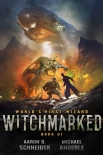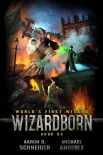Witchmarked (World's First Wizard Book 1), Aaron Schneider [most important books to read .txt] 📗

- Author: Aaron Schneider
Book online «Witchmarked (World's First Wizard Book 1), Aaron Schneider [most important books to read .txt] 📗». Author Aaron Schneider
“Even more so if that pendant was bathed in her tears when he abandoned her for another.” The she-ghul grinned, seeming to take pleasure in the thought. “Why, if the quartz was splashed with the blood of the gift-giver after she discovered his infidelity, you could name your price in the markets of Ifreedahm.”
She went on to explain that deciphering the nature of the ingredients he worked with was going to be the first step. She illustrated by taking two small bones from a crate and wrapping them in strands of hair, one strand from a pouch, the other from a small chest. Holding them up in front Milo, they looked almost indistinguishable, bare bone wrapped in wiry hair.
She placed one in his hands and asked him to tell her what he felt.
“The bone is light and the hair is wiry—” he began, but she cut him off with a sharp shake of her head.
“No, no,” she interjected, her tone as sharp as her teeth. “Those are physical properties, crude information pumped to your brain by imprecise organs. Tell me what you sense beyond that.”
Milo swallowed, confused. He expected nothing but more crude data as he closed his hand around the hair-wrapped bone. Pushing aside the information of his eyes and gripping hand, he tried to see if there was something, anything else. For a second there was nothing, only the distraction of the physical, but just for an instant, he felt a tremble, almost a flash of something...unpleasantly warm and rough against his soul. Was it anger?
Feeling more than foolish, he confessed what he’d experienced and waited for a reprimand. Instead he was treated to a Ghulish smile.
“Good,” Imrah replied and swapped the bones out. “And this?”
That one was harder, and it took him longer to push his mind past the physical. Finally, like an icy river current touching the edge of his soul, he felt fear that would drag him into raving paranoia if he let it.
“Fear,” Mil said with a shiver, ridding himself of the offending bone. “Very strong fear.”
“Very good,” she said, then walked a few steps away and placed both bones on the ground.
“Watch,” she instructed and whistled, drawing the writhing bone-powder ribbon to her.
She breathed a command in Ghulish, and as swiftly as a well-trained falcon, the ribbon dove down on the hair-wrapped bones. Particles of bone coated both. He watched as the bone he’d named as feeling angry turned into a cloud of smoke where cinders danced. The other bone frosted over, and a second later, ice crystals bloomed outward, daggers arcing several inches from the bone in all directions.
“Knowing the nature of the ingredients is paramount,” Imrah said, nodding thoughtfully at her handiwork. “Even great members of our kind have fallen prey to arrogance and imprudence when they did not check ingredients that were mislabeled or tampered with. Knowing to verify is as important as knowing what each does.”
Milo nodded, trying to ignore that there seemed to be a face in the cinders that was watching him.
“Got it: safety first.”
Imrah laughed, and Milo found that her laughter was paradoxically the best and worst of all the ghul laughs he’d heard. It didn’t have the thick, viscous quality of most ghuls’, and if he didn’t think too hard about it, it could almost have passed for human. That similarity, knowing she was most certainly not his kind, left him torn and uncomfortable.
If she noticed, she didn’t think it worth expressing, and the lesson continued. The rest of the day was spent having him handle various ingredients and seeing if he could sense their “composition,” which was always a potent emotional reaction. He often couldn’t tell, and if he stood there too long, Imrah would pluck the ingredient out of his hand without explanation and replace it with something else. Before they ended for the day, he’d held the contents of nearly every container, from burnt slivers of wood and dented spoons to the brined eyes and several varieties of shriveled organs.
Milo realized more than ever that this sort of work was not for the squeamish or the faint of heart. More than once, the “resonance” he experienced left him trembling and sapped of both physical and emotional strength. He was ready for a meal and more rest.
After Imrah relieved him of what seemed to be a petrified horse hoof or a very peculiar rock he could get no read on, she dismissed him for the day. Milo was glad to leave, but the distress that so many of the ingredients had eluded him refused to let him leave just yet.
“Am I doing something wrong?” he asked as Imrah began sealing containers.
She turned back, her expression inscrutable.
“What I mean is,” Milo continued when she offered no immediate response, “is there something I could be doing differently? You know, so I could feel all of them?”
Imrah looked over her shoulder at the ingredients and then back at Milo, her brows knitting over her unsettling eyes.
“Can you teach an eye to see a color or an ear to hear a sound?”
Milo pondered the question for a moment before answering.
“In a way, yes. You can help someone to look for specific things or pay attention to certain sounds.”
Imrah shook her head.
“That is teaching them to understand what they are hearing or seeing. To differentiate between the stimuli that are already present.”
Milo wanted to argue, mostly because the implication was far from encouraging if she was saying what he thought she was. In the back of his mind, he wondered if there had been more in the artifacts than he had detected, and his anxiety about his calculations grew.
“So, I’m never going to be able to use those ingredients, then?” he asked, frustration making his voice sharp.
He knew it was petulant to be angry at her





Comments (0)